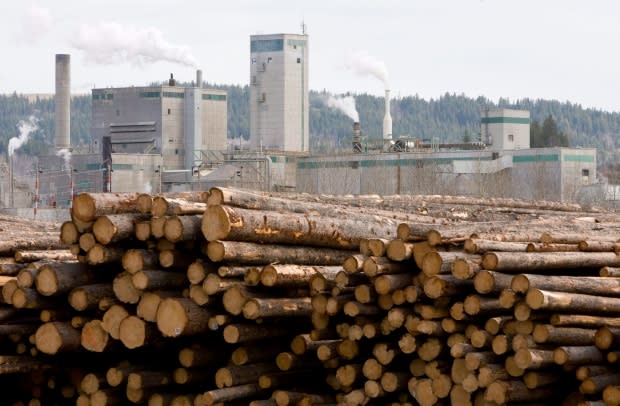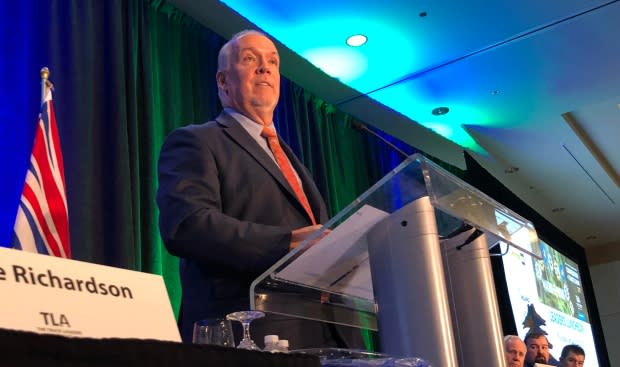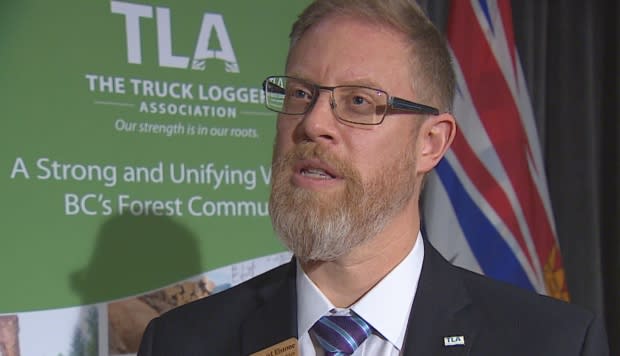B.C. vows to curb raw log exports, wood waste with sweeping policy reforms
The province has vowed to keep raw logs in B.C. after unveiling a two-year plan to revitalize forestry along the coast.
In a room filled with loggers, Premier John Horgan unveiled policy reforms aimed at incentivizing companies to process raw logs in B.C., with the goal of bucking a decades-long trend of local mill closures and increased log exports.
"We want to reduce the amount of logs going out, and increase the amount of jobs coming from our logs," said Horgan.
"We also need to send a signal to the investment community that if there are dollars that want to come into our forest industry that we have fibre to meet that demand."
Horgan did not specify what incentives there will be to keep the logs in B.C. He said those will be developed in the coming months after consultations with communities, industry and trade unions.
The province also promised to curb wood waste and make it easier for logging contractors to negotiate rates with the companies that hire them.

Raw log exports
Between 2013 and 2016, according to some reports, B.C. exported nearly 26 million cubic metres of wood worth an estimated $3 billion.
In B.C., logs are required by law to be manufactured domestically, but there are exceptions. Raw logs are subject to a "surplus test," where loggers must first advertise logs to the domestic market. If there are no fair offers, the logs can then be sold and shipped overseas.
In parts of the province where there are few or no processing plants, raw logs don't have to be offered to local industry.
Horgan says the province is looking to develop higher standards that will encourage more processing in B.C. Those will roll out over the next two years following consultations with First Nations and industry stakeholders.
He says it could mean increased fees for log exporters in certain regions, as early as the summer of 2019.
"We're not going to continue to send unprocessed material to be processed somewhere else, sometimes just a few miles from where we're having our lunch today," said Horgan.

Economic concerns
The announcement was made at the Annual Truck Loggers Association (TLA) Convention and Trade Show in Vancouver.
TLA executive director David Elstone said he was hopeful some of the changes the government is making will benefit the industry, but he says he's unsure of the economics when it comes to curbing log exports.
"There's no markets. There's no domestic processing facilities that are able to utilize that fibre." said Elstone, noting that log exports make it economically feasible to harvest second growth wood.
"There's businesses that are based on the current parameters," he added. "We need to know how it's going to work."

Curbing wood waste
The province also vowed to limit the amount of wood waste that gets left behind following big harvests. Each year, millions of tons of excess fibre are burned. According to the province, the waste makes up 16 per cent of the total harvest.
Critics argue the material could be sent to pulp and paper mills and even be used to create wood pellets.
The province plans to create fibre recovery zones in areas where hauling it from the forests into nearby pulp and paper mills is economical. Penalties will apply to companies that leave behind too much fibre.
"The regulations are no more leaving piles of waste that are not accessible to those that want to access that fibre," said Horgan.


